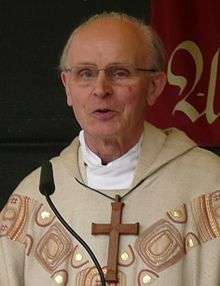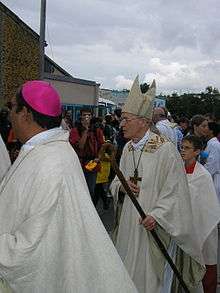Franz Kamphaus
Franz Kamphaus (born 2 February 1932) is a German Catholic priest, bishop emeritus of the Diocese of Limburg. He was bishop of the diocese from 1982 to 2007. He was the only German bishop to oppose Pope John Paul II in the matter of counseling pregnant women in conflict situations. Before being bishop, he taught pastoral theology and homiletics at the University of Münster; afterwards he became minister of a home for people with physical and mental disabilities in Aulhausen.
Franz Kamphaus | |
|---|---|
| Bishop emeritus of Limburg | |
 Franz Kamphaus, 10 August 2008 | |
| Church | Catholic |
| See | Limburg |
| In office | 1982–2007 |
| Orders | |
| Ordination | 21 February 1959 |
| Consecration | 13 June 1982 by Joseph Höffner |
| Personal details | |
| Born | 2 February 1932 Lüdinghausen, Germany |
Career
Münster
Born in Lüdinghausen as the fifth child of a peasant family, Kamphaus received his Abitur from the Collegium Augustinianum Gaesdonck. He studied theology and philosophy at the University of Münster and the Ludwig Maximilian University of Munich and was ordained as a priest on 21 February 1959 by the bishop of Münster, Michael Keller.[1] He worked as Kaplan (assistant minister) in Münster and Ahaus. From 1964 he was responsible for the diocese's Predigtausbildung (education for sermon).[2]
Kamphaus earned a doctoral degree from the University of Münster in 1968 with the dissertation Von der Exegese zur Predigt. Über die Problematik einer schriftgemäßen Verkündigung der Oster-, Wunder- und Kindheitsgeschichten, on the topic of preaching about the biblical stories of Easter, miracles and the youth of Jesus. From 1971 he led the diocese's continuing education of preachers.[2] From 1972 he taught pastoral theology and homiletics at the University of Münster. From 1973 he was also Regens (director) of the diocese's Priesterseminar (seminary for candidates for the priesthood).[2]
Limburg
On 3 May 1982 pope John Paul II announced Kamphaus as bishop of Limburg. He was ordained on 13 June by cardinal Joseph Höffner.[3] He chose as his motto "Evangelizare pauperibus" ("preach the gospel to the poor"), quoted from Luke 4:18.[1]
Kamphaus lived in an apartment in the Priesterseminar, while a family of refugees lived in the bishop's residence.[4] He spoke of a "Bundesrepublik Erde" (Federal Republic Earth) granting peace, freedom and justice for all, and said that Christians need to stand side by side with the victims, the hungry, the injured, those who flee and cry.[4]
In 1999 Kamphaus was the only German bishop who opposed the pope in the matter of Schwangerschaftskonfliktberatung, the counseling of pregnant women in difficult situations.[4][5] In his diocese, women were able to receive "Beratungsscheine" (certificates after counseling) which made unpunished abortions possible. He said that prayer and meditation helped him to take the side of the women in need, against the pope.[5] A papal decision of 8 March 2002 "stripped the bishop of his authority over the counseling centers in the Limburg diocese."[6][7] Kamphaus said: "I am still convinced that our way of counselling women would save the lives of many more children".[8] He also commented
that the Vatican's action would leave a "deep wound" in the German diocese, but said that he had concluded his resignation would not help to heal that wound. Instead, he said, he would continue to act as bishop, "wounded but unbroken" by the unusual disciplinary measure.[6]
A private association, "Donum vitae", took over the counseling, as in other dioceses before.

From 1999 to 2006 Kamphaus was president of the Commission for International Church Affairs[9] (de) of the German Bishops' Conference[1] which is responsible for international collaboration and the dialogue between religions. He travelled to Africa, Asia and Latin America, requesting more solidarity and social justice.[3]
On his 75th birthday, Kamphaus submitted his resignation to Pope Benedict XVI, who accepted it.[1] A farewell service was held in a vespers service that day. His successor was Franz-Peter Tebartz-van Elst.[3]
Aulhausen
After his retirement, Kamphaus has served as minister of the St. Vincenzstift (de), a home for people with physical and mental disabilities, in Aulhausen, where he lives. He realized that the humanity of a society can be seen in its way to deal with illness and disabilities in all phases of life.[10] Kamphaus himself suffers from tremor.[3] Facing the challenge to preach for handicapped people, he found: "Es geht darum, unsere großen biblischen Wörter zu elementarisieren, ohne dabei banal zu werden." (We need to simplify our big biblical words without getting trivial.) He stressed the importance of songs for the mostly illiterate people, and he realises: "Das Allerwichtigste ist, einfach da zu sein. Entscheidend ist nicht so sehr, was ich sage oder tue, sondern dass ich hier wohne und lebe." (Most important is to simply be there. It's not important what I say or do, but that I live here.)[11]
Awards
Kamphaus accepted only two of the many awards offered to him:[2]
Selected works
A compilation of texts by Franz Kamphaus was published in 2013, titled "Mach's wie Gott, werde Mensch" (Do it like God, become human).
- Von der Exegese zur Predigt. Dissertation University of Münster. Matthias-Grünewald-Verlag, Mainz 1968
- Gospels for Preachers and Teachers. Sheed & Ward Ltd 1974, ISBN 0-72207411-5
- Die Welt zusammenhalten. Reden gegen den Strom. Herder, 2008, ISBN 978-3-451-29754-0
- Gott ist kein Nostalgiker. Anstöße für die Fasten- und Osterzeit. Herder, 2012, ISBN 978-3-451-33329-3
- Mach's wie Gott, werde Mensch Herder, 2013, ISBN 978-3-451-32586-1
Literature
- Josef Hainz, Hans-Winfried Jüngling, Reinholf Sebott, Den Armen eine frohe Botschaft. For the 65th birthday of Franz Kamphaus. Frankfurt 2001
- Wissen, dass der Himmel trägt. Franz Kamphaus. Worte, Wege und Gefährten. Freiburg, Basel, Wien 2007
References
- "Bischof Franz Kamphaus" (in German). Diocese of Limburg. Archived from the original on 21 February 2014. Retrieved 19 January 2014.
- "Dr. Franz Kamphaus" (in German). Limburg. 1 February 2002. Retrieved 19 January 2014.
- "Gebürtiger Lüdinghausener: / Altbischof Franz Kamphaus am 2. Februar 80 Jahre" (in German). Diocese of Münster. 1 February 2002. Retrieved 19 January 2014.
- "Der frühere Limburger Bischof Franz Kamphaus wird 80 Jahre alt : Der sture, zarte Prophet" (in German). domradio.de. 2 February 2002. Retrieved 19 January 2014.
- Wensierski, Peter (15 January 2001). "Mir kann nichts passieren". Der Spiegel (in German). Retrieved 19 January 2014.
- "Pope strips some authority from German bishop". BBC. 11 March 2002. Retrieved 19 January 2014.
- "Kamphaus muss aus Schwangerenkonfliktberatung aussteigen". Die Welt (in German). 8 March 2002. Retrieved 17 January 2014.
- "German bishop capitulates on abortion". BBC. 8 March 2002. Retrieved 19 January 2014.
- Commission for International Church Affairs, Website German Bishop's Conference, visited 27 March 2014
- Deckers, Daniel (29 January 2009). "Bischof Kamphaus "Ach ja, der Franz"". Frankfurter Allgemeine Zeitung (in German). Retrieved 17 January 2014.
- Toefer, Stefan (21 December 2008). "Franz Kamphaus / Mit Leichtigkeit". Frankfurter Allgemeine Zeitung (in German). Retrieved 17 January 2014.
External links
- Literature by and about Franz Kamphaus in the German National Library catalogue
- Franz Kamphaus Catholic Hierarchy
- Bisherige Bischöfe Diocese of Limburg (in German)